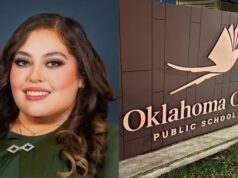
(Correction: This commentary was updated at 12:00 p.m., Friday, Jan. 26, to correct references to personal property ownership, specifically as it relates to the timeline of events covered below. NonDoc regrets the errors.)
What act of good, what act of charity, what act of service is so great that all sins past and future are forgiven? In Oklahoma City, that act is building a charter school. As illustrated by former Mayor Kirk Humphreys who, on a Dec. 10 television talk show, equated homosexuality to pedophilia. Humphreys has a long record of racist, sexist, and homophobic comments and was once, as mayor of OKC, adjudicated to have discriminated against the LBGTQ community.
Following his Dec. 10 comments, the University Of Oklahoma community found Humphreys’ presence on the Board of Regents so problematic that he was asked to resign. Yet, Humphreys remains on the board of multiple organizations, including the board of an elementary school. This begs the question: What act of good, what act of charity, what act of service is so great that all sins past and future are forgiven? Or even — what is good, what is charity, and what is service?
What is good?
I think we can agree that helping children is good, and that educating children is helping them. What if, though, helping children is not the intent? Say, if helping children is a way to personal financial gain?
FROM THE EDITORS:
Our error on Kirk Humphreys and John Rex Charter Elementary by William W. Savage III
For example, if you have been elected to a position that affords you the opportunity to map a tax program that will add value to an economically underserved area in which you ultimately seek to own property. If you know that one of the elements in turning around an economically underserved area is highly rated schools, and if, because of your unique position, you can map taxpayer money into the infrastructure in an area and then buy personal property (here, here, and here)?
Sure, you have helped create a highly rated school for children, but have you done good?
What is charity?
I think we can agree that giving money to a cause is charity. What if, however, the money you are giving is taxpayer money? Taxpayer money that you have received from deals you negotiated with the city — negotiated with knowledge you gained as an elected official of that city?
For instance, if you change the law to make it legal for you to receive payments from a large tax pool and then incrementally filter that taxpayer money to finance the building of a school in an area where you eventually purchase personal property (here, here, and here). Then, too, you give to that school-building project some of the taxpayer money you received from the deals you negotiated with the city.
Sure, you have made a charitable contribution, but have you been charitable?
What is service?
I think we can agree that doing something for someone else is service, but what if doing that something for someone else also serves the person doing the service?
For example, serving an area of a city known for its underperforming schools, where you ultimately make personal property investments, with a new and higher performing public school. And then, creating a private nonprofit to take control of the public school. So, while servicing the district, you have also favored those you believe can keep up the high performance of the school, making the district more desirable and thus increasing the value of personally property you later buy (here, here, and here).
Is this service — killing two birds with one stone — or is it just self-serving?
Charter school raises more questions
I think we can agree that there is an ongoing ideological debate over the potential benefits of charter schools. If you know that, and you are proposing building a charter school in a city, why would you not build a charter school that is above reproach? Or, at a minimum, build one that addresses the primary concerns of those who oppose charter schools to begin with?
Why would a city build a charter school that is run by a private charitable organization that has neither transparency nor accountability? Why would a public school board yield control of one of its schools to a private entity? How could a public school board approve a Memorandum of Understanding for a private entity to operate a public school that doesn’t include an anti-discrimination policy for its board members?
Answers to all contained in a single word
The answer to all these questions is the same: governance. How does Oklahoma City wish to be governed? Does Oklahoma City really wish to continue to embed racism, misogyny and homophobia into our city and schools? Does Oklahoma City really want to be governed by a small cadre of unelected elites who know how to get laws changed and exploit city taxation in a manner that could yield personal gain? Do Oklahoma City taxpayers really want public schools governed by private unaccountable entities?
Governance, taxation and education are Oklahoma City’s open frontiers. Let’s not limit ourselves.





















